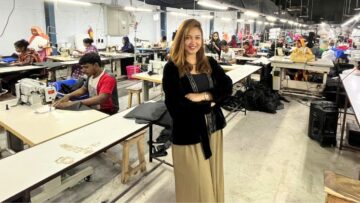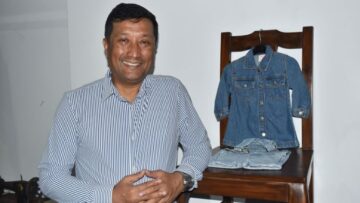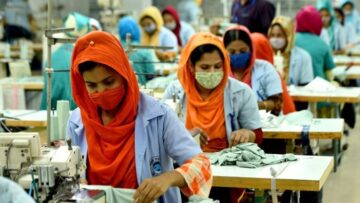Amidst a slew of challenges, some Bangladeshi RMG export companies are on a continuous growth trajectory and one of them is Shin Shin Group. As the group approaches two decades since its inception in 2005, it now has five units which manufacture woven bottoms, denim jackets, dungarees, school uniform, formal and tailored jackets, formal trousers, over coats, trench coats to successfully cater to a wide range of global brands and retailers, including names like H&M, Walmart, Inditex Brands Pull & Bear & Zara, Next, Primark, Asda, Saintsbury’s and many more. In a candid discussion with Mohammad Sohel Sadat, Chairman of Shin Shin Group and recently elected Board Director of the Bangladesh EPZ Investors Association (BEPZIA) for 2024-25, Team Apparel Resources explored how the group is heading towards growth through a focus on tailor-made garments, sustainability initiatives, training for mid-level professionals and efforts to work on short lead times.
In FY ’24, Shin Shin Group had a turnover of around US $ 104 million, and despite the challenges this year, it is expected to reach around US $ 120 million in FY ’25. Mohammad Sohel is making concerted efforts across all fronts, including sustainability, client service, worker treatment and continuous improvement at various levels. Therefore an expected growth rate of around 18 per cent – 20 percent is anticipated, although he is concerned about profit pressure and the potential impact of geopolitical conditions on growth. He notes that price pressure is becoming one of the biggest challenges, requiring various steps to overcome this issue. “Though a certain margin like 7 per cent to 8 per cent is necessary for survival, it is very difficult to secure this reasonable margin. We are increasing our efforts to survive and grow.”
New focus on tailor-made products
Shin Shin Group mainly focuses on woven garments, with some involvement in knits through coordinate set collaborations with other factories. While the company also produces menswear and womenswear, its major strength lies in kidswear. In addition to bottoms, it has multiproduct capabilities, including casual shirts, dungarees, chinos, cargoes and bermudas.
The group is now placing greater emphasis on tailor-made garments, with a specific unit named Suad Garment Industries dedicated to this effort, enhancing product diversification and value addition for its esteemed clients.
With 18 production lines and an annual capacity of 7.2 million pieces, this vertical (Suad Garments) specialises in manufacturing blazers, jackets, suits, ladies’ fluid dresses, formal wear, and professional workwear for both men and women. “In woven products like five-pocket bottoms, capacity is almost saturated in terms of overall buying. Tailored products were previously missing from our extensive range, and now, with this new initiative, we can cater to this product category for our esteemed clients. We expect good growth in this area,” said Mohammad Sohel.
Increased focus on sustainability and worker welfare
The group’s sustainability initiatives address nearly all aspects of sustainability, exemplified by its recent receipt of the Green Button award from Deutsche GIZ GmbH for outstanding achievements through the Green Button Qualification Programs for its sister companies, Organic Jeans Ltd and Vancot Ltd. Both companies have made significant progress in six key areas of the Step-by-Oeko-Tex Program, a comprehensive sustainability certification initiative focusing on critical aspects of sustainability: environmental sustainability, social sustainability, quality management, chemical management and health and safety.
In 2022, the group achieved 300 kW of green energy production and harvested 3,124 m³ of rainwater. For its various clients, the group uses recycled polyester fabric and trims. It is further geared up to enhance its green initiatives; out of the five factories, one is LEED-certified Gold rated, with plans to gradually certify the others. As the other factories have most of the required systems already in place, achieving such certifications does not seem overly challenging.
Regarding washing, the group employs a biochemical system and is gradually transitioning toward biological processes. Moving forward, the company is also focusing on systematic reporting on sustainability. Already strong in CSR activities such as educational programs for workers’ children, health center, scholarship programs, and housing initiatives for workers it is in the process of allocating a pre-determined budget for these efforts. At every factory, male and female workers receive equal perks and privileges. The group has also partnered with Wagely, a financial wellness platform, to provide workers with instant access to their earned wages. Through the Wagely digital app, workers can withdraw up to 60 per cent of their monthly wage in advance during times of necessity or emergency.
Additionally, the group has introduced biometric-enabled sanitary pad vending machines in front of every female restroom in its factories, allowing workers to collect sanitary pads free of charge. Being a member of ILO Better Work program, Shin Shin Group is promoting decent work environment at its every facility. Shin Shin’s commitment to inclusive business is another important area which allows barrier free access to all. Shin Shin Group has opened its premises to persons with disability since 2016 by signing a self-declaration with ILO. Presently more than hundred persons with disabilities are working in all of its factories. The group has launched a campaign ‘say no to plastic’, while banning plastic bottles in its corporate office. Gradually this will be implemented in all offices and factories. The group has also the ambition to make the company paperless through digitisation. Targets have been given to departments to gradually reduce use of paper in their work.
Increased focus on training
The company has improved its ability to deliver orders on shorter lead times, now capable of fulfilling specific orders in as little as three weeks. This is achieved by keeping a ready supply of raw materials and speeding up the entire process. The group has also hired several international experts from Sri Lanka and Scotland, focusing more on training for its mid-level management. “Now buyers want products delivered from the factory floor to their showrooms. Our competitive countries have the advantage of proximity to retail destinations; nearshoring and local production have emerged as significant challenges for us. Therefore, it is crucial that we meet the lead times set by buyers, which requires us to be sharp in everything from raw material sourcing to timely and quality production,” stated Mohammad Sohel.
Overall, Shin Shin Group delivers 98 per cent of its orders on time, achieving the same first inspection pass rate. Mohammad Sohel believes there is always room for improvement and training is essential for enhancing performance. “Given the growing challenges at all levels and the increasing demands on business, our industry needs to focus more on training mid-level management. We are in the process of identifying key areas and finalising the budget for training. Rather than solely concentrating on balance sheets and turnover, it is more beneficial to seek additional business within our existing setup by enhancing wherever improvements can be made,” he concluded.







